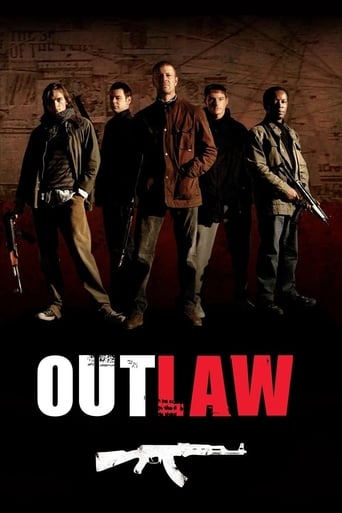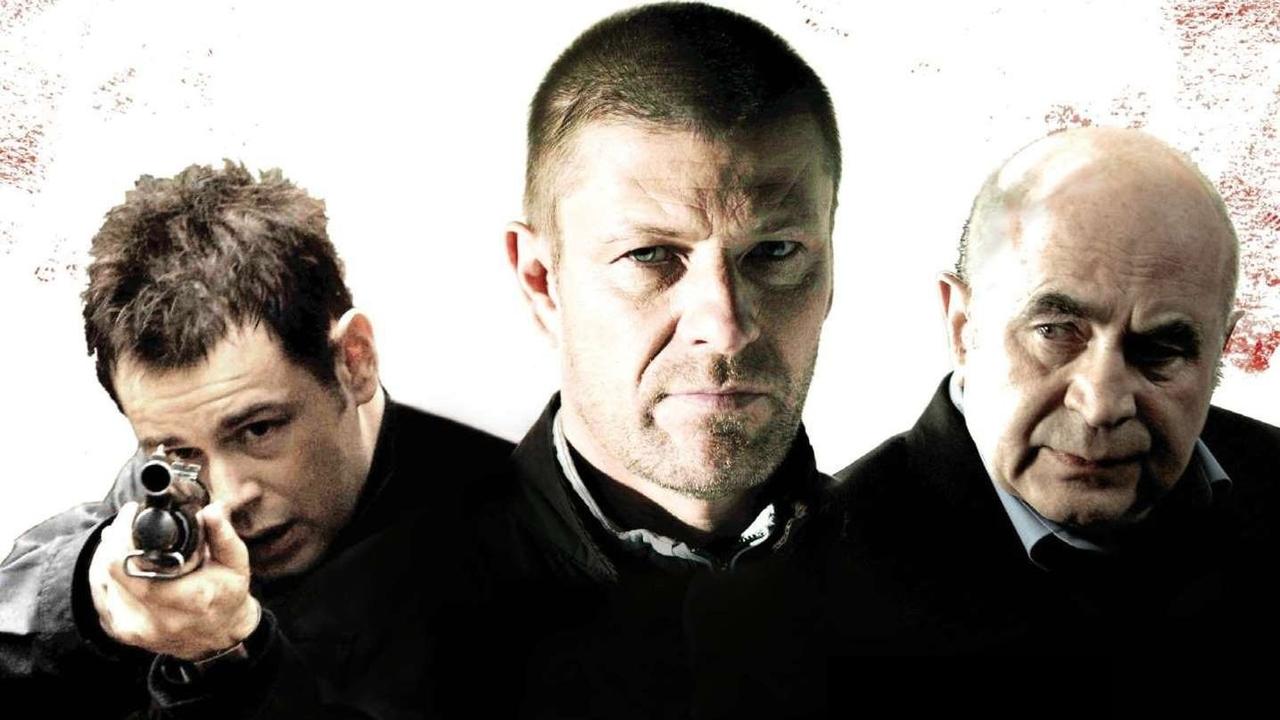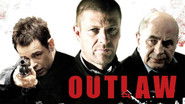David Holt (rawiri42)
Outlaw definitely made me wonder... about myself.I have often thought that, in a different life, I could have been a hit-man and those feeling certainly rose to the surface as I watched this movie. A bunch of unlikely guys with a common thread come together as much by chance as anything else when they are let down by society. One (Sean Bean) has suffered the unimaginable (unless you've been there) horrors of war in the middle east only to come home to find his wife in bed with another man. Another (Danny Dyer) has been beaten half to death by a gang of mindless street thugs. A Negro barrister (Lennie James) has his pregnant wife murdered because, with a moral interest in serving society and make the world a better place, he won't walk away from prosecuting a criminal drug dealer who has bent London cops on his payroll.As the plot built and the scene was set I found my anger rising by the minute along with the victims of criminal rule as a state of anarchy was graphically portrayed. I wanted to wreak retribution on the low-life perpetrators and so, when that began to happen, rather than feeling offended, I felt exhilarated. I know I could have pulled the trigger without compunction!I guess one thing I wouldn't have done personally was work as a team which the vigilantes did. I would have preferred to work anonymously and alone. I was reminded a bit of the TV series, "Arrow" although "Outlaw" was a lot more realistic than that. Some of the vigilante gang were hampered by moral qualms about what they were doing whilst I was almost eagerly wanting to not only dispose of the thugs and bullies but to do so in a slow and painful way! Hmmmm.So, for me, Outlaw was more of a social statement than just a movie. I was reminded of news stories on TV like one recently where a beautiful young pregnant wife was raped and murdered on her way home from work at Macdonalds just down the road from my home and the 18-year-old perpetrator - who had had a bad family situation - was given a token jail sentence by some bleeding-heart judge. I just hope he ends up in a jail where the other inmates will deal out the justice that the courts so often fail to deal out. I don't want to pay (they tell me) over a million dollars a year to keep that scum-bag in an air- conditioned jail where he will get three healthy meals a day prepared for him and won't even have to do the washing up. If it was up to me, he would have been executed and the world rid of one more waste of time!But the bleeding-heart brigade say that's inhuman! I wonder what the judge would say had the victim been his daughter! So, as it is, we NEED people like Sean Bean and his mates to clean up the filth from our streets. I loved the closing shot and, when Manning said his line, I said aloud, "Wanna bet?!"OK, many might say that Outlaw portrays a side of life that they don't want to go to the movies thrust at them and I wouldn't mind betting they're the ones who lobbied their MPs to have corporal punishment abolished. Well, maybe they don't realise it but the situations portrayed in this movie exist in just about every big city in the world.
Leofwine_draca
When I saw the trailer for OUTLAW I knew I wanted to see it – Sean Bean is one of my favourite actors and I loved the look of the vigilante plot. But it was one of those films that slipped by until now, when I finally caught up with it on TV one night. I'm glad I didn't get to it sooner.The film is a crushing, no-budget disappointment, nothing like it's made out to be in the trailer. The plot is passable at best, and while it contains some intense, shocking moments (the attack on the barrister's wife is one of the most disturbing I've seen in some time), it never seems to go anywhere, and by the end turns into the usual good guys vs. arch villain type action flick. Some scenes are ludicrous, like the bit with the shoot-out with the police in the wood, and the characters are never likable as they should be. Take Sean Bean's lead for instance – he's a disturbed ex-soldier, yes, but we never learn a thing about his background or what makes him tick. Bean tries hard to make the best of the material, but his talents are wasted here.It's a shame, as the talents of other decent actors – such as Lennie James and Bob Hoskins – are also left unexploited to their full potential. The biggest problem of all lies in the director, Nick Love. For some stupid reason, he adopts a shaky cam in an attempt to give his film edge, but it's distracting at best and nauseating at worst. Paul Greengrass he certainly isn't – and the camera-work alone is enough to ruin what was potentially an interesting film that raises some important questions about crime and justice.
azwandy
I've tried to watch the first 5 minutes of the movie but once I've suffered from dizziness due to excessive focus/out of focus mobile-style video camera then I stopped from watching it. The nauseous feeling was far much more worse than watching a 3D movie. There's no problem if you were experimenting the shot/camera but this is too much.Not recommended to anyone. Better waste your money on any other thing else.The theme for this movie is great but the execution was poor once leaving me no choice but to stop watching it after just barely 5 minutes.
James Hitchcock
"Outlaw" is a British "Death Wish" revisited for the twenty-first century, with the difference that Michael Winner's film featured one single vigilante, whereas "Outlaw" features a whole gang of them, even though the title is singular rather than plural. All the members of the gang have, in one way or another, been victims of crime or have reason to believe that justice in Britain is not being administered fairly. Led by Danny Bryant, a former soldier, they form their own vigilante army to take on the nation's criminals, and their exploits bring them to the attention of the media, who dub them "The Outlaws". Their main target is Terry Manning, a gangster whose associates were responsible for the death of the wife of one of the group's members."Death Wish", made in 1974 and set in New York, was very much a film of its place and time. The seventies were a period when New York was gaining an unenviable reputation as a lawless, crime-ridden city. (Today the city has lower levels of homicide and violent crime in general than most major American cities). The actions of Charles Bronson's hero Paul Kersey therefore struck a chord with many New Yorkers and other Americans concerned about what they saw as the breakdown of law and order."Outlaw" does not reflect its place and time in the same way. It is set in the United Kingdom of 2007, the year it was made. Bryant claims that contemporary Britain is more violent than Afghanistan or Iraq, both countries in which he has served, and the London we see in this film has effectively been turned into a war zone by criminal gangs. The police are generally portrayed as hopelessly corrupt and in league with the criminals they are supposed to be fighting. (One of the vigilantes, Walter Lewis, is himself a policeman, one of the few honest men on the force, who has turned to vigilantism because he is sickened by his corrupt colleagues allowing notorious villains to go free. His main function is to provide Bryant and the others with information on their targets).The trouble is that few modern Britons, unless they have a particularly morbid fear of crime, would recognise this as an accurate portrait of their country. Although some elements within the media have tried to sensationalise the issue, crime rates have actually been falling in recent years, and although there is undoubtedly police corruption in Britain it is nowhere near as pervasive as depicted here.The film is at places difficult to understand and there are a number of plot-holes; it is never, for example, made clear just why Bryant decides to spare the life of Ian Furlong, one of Manning's most vicious sidekicks, and then hangs Simon Hillier, one of his own gang, for insubordination."Death Wish" certainly had its faults, but it was in some ways a professional, well-made and well-photographed piece of filmmaking. "Outlaw" is very different in its visual style, with a dull, washed-out palette (many of the scenes take place at night or in dim light) and with some very shaky camera-work; presumably the reason was to give it a grim, unattractive look to match its subject-matter. The standard of acting varies; the best on display is from Sean Bean, an actor who can be a very good one if cast in a better film than this one. I was surprised to see another distinguished British actor, Bob Hoskins, cast as Lewis, largely because at 65 he seemed too old to play a serving police officer.My main reason for disliking the film, however, was the stance it took as regards its subject-matter. It might have been better if it had been set in some future dystopia, but writer/director Nick Love went for a contemporary setting. This affects the way we view Bryant and his colleagues. Vigilantism might be justified in a society where law and order has collapsed and ordinary citizens have no other means of self-defence or of obtaining justice against those who wrong them. In a modern Western society, however, vigilantes are little better than gangsters whose activities make them part of the problem of lawlessness, not part of the solution. Love, however, comes perilously close to making his "outlaws" seem like heroes standing up for the Common Man against both the authorities and the villains whom the authorities allow to flourish. 4/10



 AD
AD




